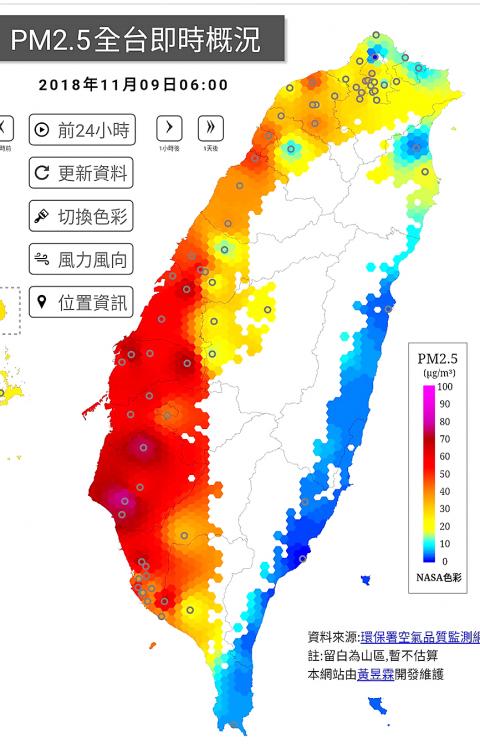Air quality in northern Taiwan has improved as pollutants are carried away by stronger winds, but it is forecast to be poor in central and southern regions, the Environmental Protection Administration said yesterday.
On Thursday, air pollution in the nation was at its worst this autumn, mainly due to domestic pollutants that were hard to disperse in the absence of wind, Department of Environmental Monitoring and Information Management Director-General Chang Shuenn-chin (張順欽) said.
While air pollutants produced by sources near the ground can spread to an altitude of up to 2km, they were trapped under 400m on Thursday, he said.

Photo: Copied by Tsai Wen-chu, Taipei Times
As the speed of a northeast monsoon increased slightly yesterday, air quality in the north has improved, but southern regions — especially Yunlin, Chiayi and Pingtung counties, as well as Tainan and Kaohsiung — might still experience poor air quality tomorrow, as the winds are not strong enough to carry away pollutants in those areas, he added.
Wind speeds are forecast to fall over the weekend, which might lead to pollutants accumulating again, Chang said, but added that the air quality would improve again, as the northeast monsoon is forecast to strengthen from Monday to Thursday next week.
Asked about allegations that it tries to downplay the effect of domestic pollution, Chang said that the agency issues three air quality forecasts every day and does not put more emphasis on air pollution from China.
The agency did not issue an early warning for air pollution on Thursday because local pollution takes time to accumulate and is more difficult to predict, while overseas pollution carried by cold fronts from northern China is more predictable, he said.
In related news, two parades demanding clean air are to take place in Kaohsiung tomorrow and in Taichung on Sunday next week.
The parades are to demand that the government propose schedules to decommission the coal-fired Sinda Power Plant (興達電廠) in Kaohsiung and the Taichung Power Plant, organizer Air Clean Taiwan said.
The issue of air pollution should not be politicized and used to attack political enemies, Taichung Mayor Lin Chia-lung (林佳龍) said yesterday, adding that the Taichung City Government last year required the Taichung Power Plant to reduce its coal use by 5 million tonnes.
Additional reporting by Chang Hsuan-che

The first global hotel Keys Selection by the Michelin Guide includes four hotels in Taiwan, Michelin announced yesterday. All four received the “Michelin One Key,” indicating guests are to experience a “very special stay” at any of the locations as the establishments are “a true gem with personality. Service always goes the extra mile, and the hotel provides much more than others in its price range.” Of the four hotels, three are located in Taipei and one in Taichung. In Taipei, the One Key accolades were awarded to the Capella Taipei, Kimpton Da An Taipei and Mandarin Oriental Taipei. Capella Taipei was described by

EVA Airways today confirmed the death of a flight attendant on Saturday upon their return to Taiwan and said an internal investigation has been launched, as criticism mounted over a social media post accusing the airline of failing to offer sufficient employee protections. According to the post, the flight attendant complained of feeling sick on board a flight, but was unable to take sick leave or access medical care. The crew member allegedly did not receive assistance from the chief purser, who failed to heed their requests for medical attention or call an ambulance once the flight landed, the post said. As sick

The Taichung District Court yesterday confirmed its final ruling that the marriage between teenage heir Lai (賴) and a man surnamed Hsia (夏) was legally invalid, preventing Hsia from inheriting Lai’s NT$500 million (US$16.37 million) estate. The court confirmed that Hsia chose not to appeal the civil judgement after the court handed down its ruling in June, making the decision final. In the June ruling, the court said that Lai, 18, and Hsia, 26, showed “no mutual admiration before the marriage” and that their interactions were “distant and unfamiliar.” The judge concluded that the couple lacked the “true intention of

A drunk woman was sexually assaulted inside a crowded concourse of Taipei Railway Station on Thursday last week before a foreign tourist notified police, leading to calls for better education on bystander intervention and review of security infrastructure. The man, surnamed Chiu (邱), was taken into custody on charges of sexual assault, taking advantage of the woman’s condition and public indecency. Police discovered that Chiu was a fugitive with prior convictions for vehicle theft. He has been taken into custody and is to complete his unserved six-month sentence, police said. On Thursday last week, Chiu was seen wearing a white